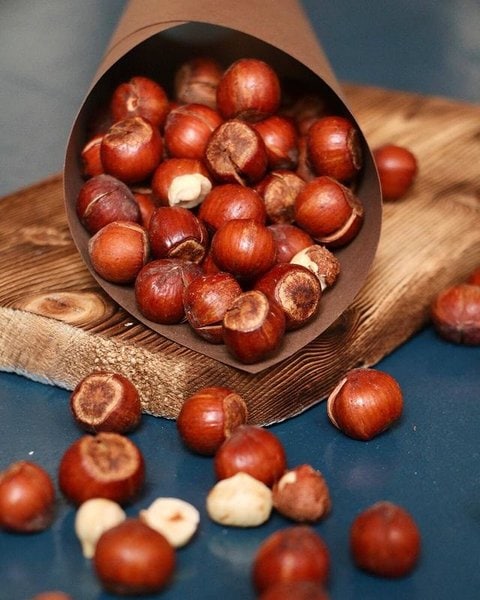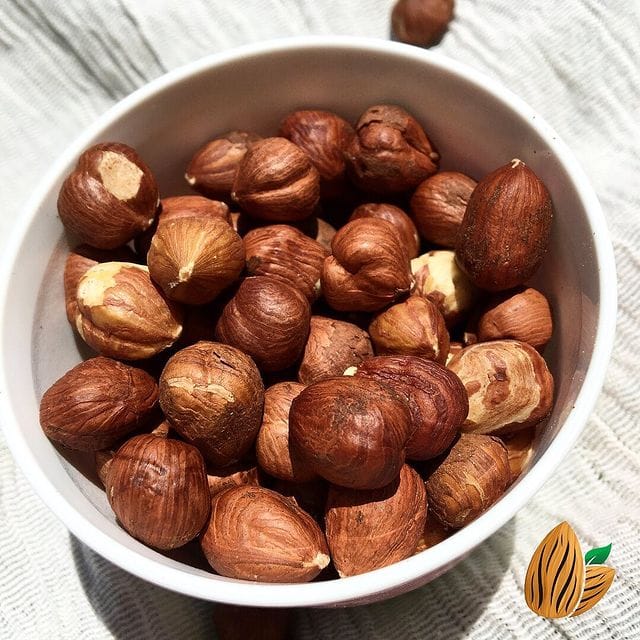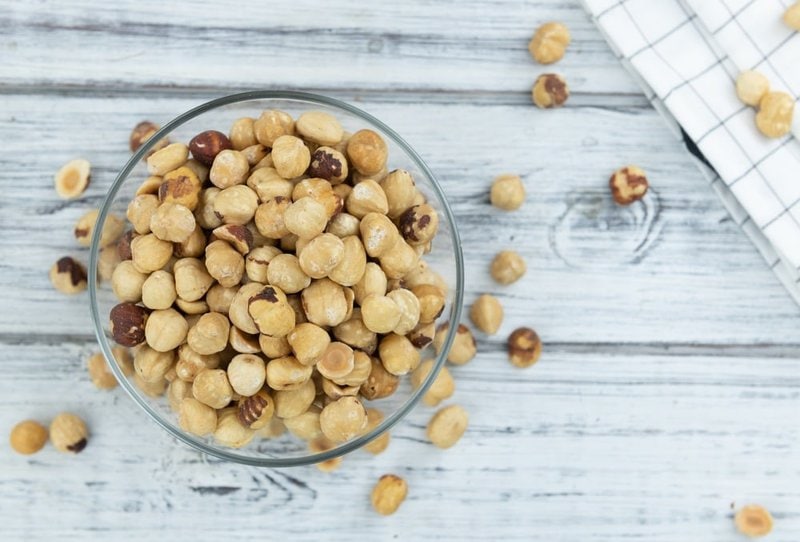Hazelnuts are a pantry staple in most homes today. They are great for everything from jazzing up smoothies and salads to snacking on or even making homemade nut butter. If you have looked at your jar of hazelnuts and wondered whether it is safe for your doggy, you have come to the right place.
To get the biggest question out of the way first, it is actually safe to give your dog hazelnuts as treats. Hazelnuts are among the nuts regarded as not only safe but great for your dog’s health. They are found to be a rich source of vitamin B, greatly improving the metabolic system in dogs.
So what else do hazelnuts have to offer your doggy? How much of the crunchy treat can they have? All these and any other questions you may have about hazelnuts in your dog’s diet will be addressed shortly.
Here is all you need to know about feeding hazelnuts to your dog.
Can Dogs Eat Hazelnuts?

Dogs can safely eat hazelnuts. The most important thing to remember is to practice moderation. With the appropriate serving sizes, hazelnuts have a lot to offer your dog in terms of nutritional benefits.
Here are some of these health perks.
Antioxidant Effects
Hazelnuts are a great source of natural antioxidants. These essentially clear your dog’s system of toxic byproducts of day-to-day cellular activity.
By detoxing your dog’s body on a regular basis, you minimize the chances of your dog developing health issues like cancer and heart disease later on in their lives.
Vitamins
Hazelnuts are rich in a variety of vitamins that your dog’s body needs for optimal functioning of all the key systems. The most abundant of these vitamins include vitamin E, which plays a huge role in ensuring your dog’s coat remains healthy and beautiful.
Furthermore, your dog will get many different kinds of vitamin B from the hazelnut snacks, including vitamins B3, B6, as well as B9 that is also known as folate. These vitamins primarily aid and improve the metabolic system in dogs.
Minerals
Dogs require minerals for all sorts of body functions, from the formation of bone to immune system regulation and muscle contraction. Hazelnuts provide a number of these important minerals, including phosphorus, magnesium, manganese, and copper.
What’s unique about this micronutrient source is the fact that most of its minerals are not easily found in most foods in your dog’s diet.
Healthy Fats
About 80% of one hazelnut is fat. Before you banish this snack from your dog’s diet, it is important to appreciate that the kind of fatty acids in hazelnuts are the good kind.
These include omega-3, which will help ensure coat health for your doggy. The omega-3 fatty acid also has other health benefits, including reducing the risk of heart disease as well as promoting brain development.
Are Hazelnuts Safe For Dogs?

Generally speaking, hazelnuts are safe for dogs and are among the few kinds of nuts that are non-toxic to dogs. However, it is not entirely a risk-free snack. Here are a few times where hazelnuts could be a health hazard when fed to your dog.
Choking Hazard
As with most other nuts and small, hard snacks, there is always the risk that your dog could choke on a hazelnut. This is likely to happen if your doggy is the kind to gobble up food quickly and excitedly.
To avoid this potentially life-threatening risk, ensure that you supervise your dog as they chow down on the crunchy and nutty treat. It is also best to feed them one hazelnut at a time.
Nut Allergies
Nut allergies are relatively rare in dogs but not entirely unheard of. In these cases, the dogs may have adverse reactions to nuts like hazelnuts that are otherwise considered healthy and safe.
If your dog is allergic to nuts, feeding them, hazelnuts could trigger a reaction with signs and symptoms including:
- Itchiness and intense scratching
- Dry heaving
- Inflammation spots on their coat
- Vomiting and diarrhea
- Puffy eyes
In very severe allergic reactions, your dog may go into anaphylactic shock. This is a life-threatening complication that will require urgent vet attention. It is typically marked by difficulties in breathing, an altered state of consciousness, and an abnormal heart rate and rhythm.
Gut Obstruction
Hazelnuts are a fairly decent source of fiber in your dog’s diet. However, if they are swallowed whole, they are very likely to cause blockage in your dog’s gut. In this case, you will notice that your dog is constipated.
With time, their abdomen may become swollen, and their appetite reduces. In very severe cases, your dog may require surgery to relieve the blockage and to put them out of its misery.
Gut Upset
Due to the high-fat content in hazelnuts, if your dog eats too many hazelnuts, there is a high chance of them developing gut irritation. More often than not, this manifests as diarrhea and general abdominal discomfort.
The discomfort will make your dog resistant to being handled or even being petted. They may also have a low appetite due to the irritated gut lining.
What Should I Do If My Dog Eats Too Many Hazelnuts?
If your dog eats too many nuts in one go, the best thing to do is call your vet and book a consult as soon as possible. The biggest risk that you will have to get addressed first is that of intestinal obstruction.
If your dog is already showing features of gastrointestinal irritation, a veterinary intervention will help ensure that your dog recovers quickly and safely. This may include rehydration therapy to avoid issues like kidney injury from diarrhea or vomit-induced dehydration.

Can Dogs Eat Hazelnut Spread?
While hazelnuts are typically safe to give to dogs, hazelnut spreads may not always be safe for your doggy. More often than not, these spreads are made using ingredients that are notoriously toxic to dogs, including chocolate and artificial sweeteners like xylitol.
The hazelnut spread may also contain ingredients like natural sugar, which, though not toxic to dogs, is not advisable to feed the pooch in large amounts.
Finally, the chemical additives like flavor enhancers and preservatives used in hazelnut spreads could have serious long-term effects on the dog’s health.
In a nutshell, it is best to avoid hazelnut spread altogether in your dog’s diet, as the risks far outweigh the benefits of the tiny amount of hazelnut in the spread.
However, if you make the hazelnut butter at home without any of these harmful ingredients, the spread would be nice and creamy to serve directly or with your dog’s meals.






